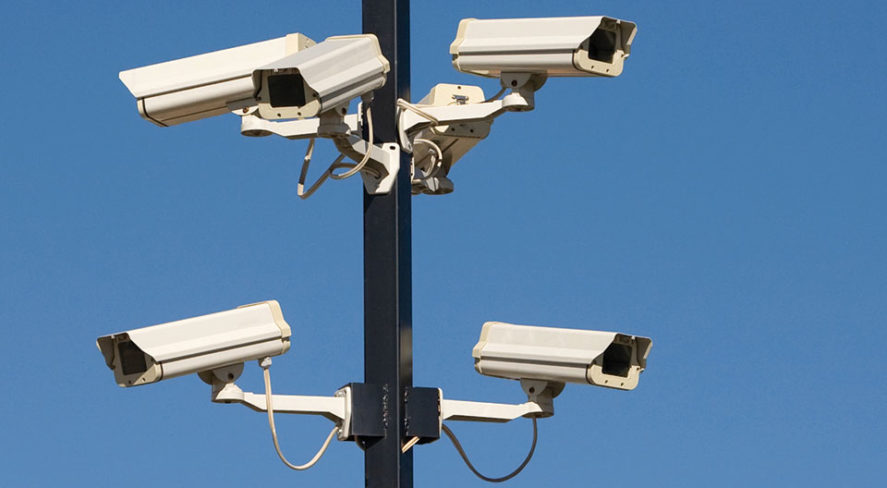The Unique Benefits of CCTV Towers: Overt Security Has Its Advantages


Retailers have had cameras, both inside and outside their stores, since the VCR made it economical. Traditionally, the cameras have been hidden in corners, mounted on light poles, or attached to the sides of buildings. But that is changing. Now when visiting retailers, customers might actually notice the cameras because they are not subtly installed on the roof. Instead, they are mounted to an imposing mobile trailer or tower.
CCTV trailers and towers are the newest security trend sweeping across multiple industries, including retail, construction, law enforcement, critical infrastructure and more. These towers are stationed outdoors and can include wheels and a hitch for easy mobility, as well as solar panels, batteries, flashing lights and other features. When deployed, they can measure more than 20-feet high, so they are hard to miss. Why are CCTV towers making such an impact? And how are they different from a typical pole-mounted or building-mounted camera?
Mobile security towers provide several benefits over traditional security cameras, and even over guards. First, they can help prevent problems, not just record them. Second, they can increase safety on the property for both employees and customers. Third, they can send autonomous, mobile alerts around the clock. And fourth, they are easy to install since they do not require hardwired communication or power lines. Instead, they can be deployed quickly wherever there is a problem.
Deterrence-Based Security
The biggest advantage to CCTV towers is that they help prevent crimes, instead of just recording them as they happen, by employing deterrence-based measures.
These mobile surveillance units are imposing. If they are deployed in a parking lot, they will often take up an entire stall, and they have a massive mast that extends several dozen feet into the air. Furthermore, most have a head unit with multiple cameras. Obviously, each tower will look and function differently depending on which company manufactured it. Some will have strobe and flood lights whereas others will not. Some even have an attached speaker that allows remote personnel to audibly interact with people onsite. Each company adds different features to fit their clients’ needs. However, no matter what features the towers may or may not have, they all share one characteristic – they are extremely overt.
And overt security works. Mike Lamb spent his career in retail security. He worked for more than four decades as the head of asset protection and loss prevention for multiple Fortune 500 companies, including The Home Depot, Walmart and the Kroger Company.
“Traditionally, asset protection is playing a game of catch-up,” Lamb said. “Countermeasures are only implemented after an incident has happened.” But by deploying CCTV towers, Lamb found a way to get ahead of criminals.
Lamb deployed towers to retail parking lots across the country. “The benefit of these towers is that the bad guys see it, get it, and fear it – then leave,” he said. “Criminals are always looking for the easy target, the low-hanging fruit, and these towers take that option away from them…A strategy focused on prevention is much more effective than one focused on reactive measures.”
Increasing Safety
The deterrence factor does not just scare away criminals, it also makes customers and employees feel safer. Instead of seeing the units and fearing them, as criminals do, they see them and are comforted knowing that someone is watching, and that criminals are less likely to strike when under surveillance.
Another national retailer with CCTV security trailers said, “Customers intuitively know that this (area next to the unit) is a good place to park. In fact, a young lady parked underneath it and we asked why. She pointed at the unit and said, ‘Because of this. I know nobody is going to mess with my car if I park here and, if they do, you guys will have video of it.’”
CCTV towers are unique in their ability to scare bad actors away from the property and improve the site for customers. One retailer said, “Having something that can monitor the parking lot and keep our employees and customers safe is a win-win.”
Furthermore, retailers have found that the steps they take in the parking lot have impacts elsewhere.
“By effectively mitigating crimes occurring in the parking lot, there’s a residual benefit to any criminal activity that was occurring inside the store,” Lamb said. “If you can prevent the bad guys from entering the parking lot, they will not enter the store. Deterrence-based security enhances your brand for honest customers because it creates a safer environment and increases positive interactions with your brand.”
Autonomous, Mobile Alerts
The third difference between traditional security cameras and CCTV towers is autonomous alerts. Traditional cameras rely on guards identifying threats from the feed while onsite in a backroom. This system inherently has some problems. First, guards are human and will never be perfect. They will miss things if they are late or call in sick, if they accidentally fall asleep or are distracted by their phones or a coworker. Even under the best of circumstances, human attentiveness when watching security video wanes quickly.
In addition, having a guard in a backroom is a waste of resources. Retailers have found that human guards are one of the best deterrents for theft and other crimes, even more than CCTV towers. So why pay a guard to monitor the feed when they can be better utilized elsewhere?
CCTV towers can augment and, in some cases, replace guards because they use artificial intelligence (AI) to trigger alerts. An end user can designate an area they want the camera to watch and specify when to watch it, what to look for, and what the response should be if one is needed.
When an alert is triggered, the user can log in to the feed remotely and see what is happening – whether it is just a vehicle driving through or a crime in progress. It gives the user the chance to intervene with features on the unit (like lights and speakers) or to call security or local law enforcement. Either way, the end user can better direct their efforts because of the CCTV tower. In this instance, a guard is replaced because the tower tells the user when there is an issue, rather than a human middleman relaying the message.
Autonomous alerts can also help augment the abilities of guards on patrol by pointing them to the right place. “Even at their best, guards are only effective at one place, at one time,” Lamb noted. “However, with the tower helping watch, the guards can know when and where to direct their efforts.”
In short, autonomous alerts from CCTV towers help leverage guards and security budgets while increasing situational awareness. They identify when there is a threat and when human attention is required. They watch 24/7 and they never take a day off.
Rapid Deployment
CCTV towers have a huge advantage over traditional surveillance cameras because they are quick to install. In fact, some CCTV trailers can be deployed in as little as 30 minutes. This opens the door to quick responses by asset protection teams instead of having to wait weeks or months for installation.
Most CCTV towers rely on a combination of solar power, batteries and backup generators. Furthermore, while some connect to Wi-Fi, others use cellular connectivity. These features ensure that the towers are completely mobile and require no construction. Cameras mounted on a pole or on the building do not enjoy this advantage.
The mobility of the units allows additional freedom. If a unit is deployed to the front of the store but a problem develops at, say, the fuel center, relocating the tower is easy. Interestingly, retailers who use CCTV trailers will move them around on the property but tend to leave the units on location. They avoid moving them offsite because of parking lot liability.
“Not only do the towers increase safety on the property, but they also help mitigate risk for the retailer,” Lamb said.
Conclusion
CCTV cameras are everywhere, especially in retail. Traditional cameras on poles or the side of a building capture video but are a passive form of security. As retail crimes continue to grow, passive security measures will not be enough. While there is no silver bullet solution, retailers are taking every step they can to protect their customers and employees, their assets, and their properties.
Unlike traditional cameras, CCTV towers are very overt and intentionally so. Overt solutions still capture the same video feeds, but criminals see them, understand them, and fear them much more readily. Furthermore, the deterrence-based solution does not scare away customers or employees, but actually helps them feel safer.
While other cameras may use AI analytics, CCTV towers can put the analytics into action, not only through autonomous alerts but also by providing the physical tools the user needs to act on those alerts remotely. Instead of just watching something happen, a client can use the lights and speakers to respond and prevent wrongdoing.
Lastly, the towers are quick to deploy. While other solutions can take weeks or months to get a plan approved, a construction team onsite, and the lines run, CCTV towers do not need hardwired communication or power lines. Instead, they use solar, cellular connectivity, and other mobile technologies to help retailers solve problems quickly.
All of these advantages make CCTV towers the next big thing in enterprise security.
David Studdert (dstuddert@lvt.com) is the chief business development officer of LiveView Technologies (lvt.com).
